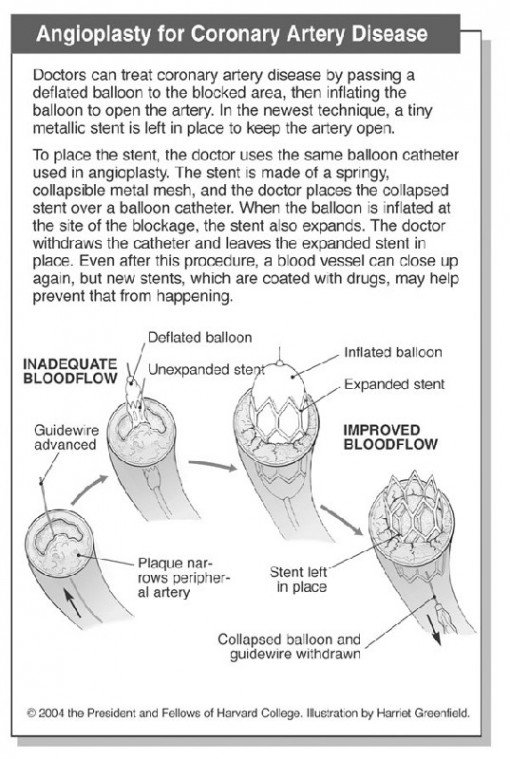By the faculty of Harvard Medical School
Q: Former President Clinton’s bypass surgery appears to have
gone smoothly, probably due in part to the quality of his care.
How can coronary bypass complications be avoided, and are there
any alternatives to surgery?
A: Certainly, President Clinton had access to top specialists,
but anyone who needs bypass surgery can take steps toward excellent
care, too.
By the faculty of Harvard Medical School
Q: Former President Clinton’s bypass surgery appears to have gone smoothly, probably due in part to the quality of his care. How can coronary bypass complications be avoided, and are there any alternatives to surgery?
A: Certainly, President Clinton had access to top specialists, but anyone who needs bypass surgery can take steps toward excellent care, too. Knowing the risks involved and carefully evaluating surgeons and hospitals beforehand can go a long way toward minimizing your risk.
A task force of the American College of Cardiology/American Heart Association offers the following guidelines for evaluating surgeons and institutions:
n Check to see that the surgeon is certified by the American Board of Thoracic Surgery, indicating that she or he is experienced in cardiac procedures.
n Find a hospital that has a cardiac team, because it is more likely to be up on current information and to have multiple cardiac
surgeons available, in case of emergencies.
n Find a hospital that performs at least 200 open-heart operations a year. Research has shown that the risk for complications or death from bypass surgery is lowest with hospitals
that perform the most bypass operations.
n Find a surgeon that performs at least 100 open-heart operations a year. Research has shown that the risk for complications or death from bypass surgery is lowest with surgeons that perform the most bypass operations.
In some cases, such as that of President Clinton, bypass surgery is unavoidable. But for some, there are other options for opening up blockages caused by atherosclerosis of the coronary arteries (the arteries that feed blood to the heart muscle). To tell if these alternatives are safe for you, consult your doctor.
Along with healthy eating and regular exercise, medications can be valuable and sometimes are all that is needed for controlling the symptoms of coronary artery disease. Some drugs help prevent angina or eliminate chest pain during angina episodes. Other drugs lower blood pressure or reduce the risk for blockages in the coronary arteries by helping to prevent blood clotting. Most people with heart disease need to take more than one medication. The specific combination of drugs will depend on your particular symptoms and risk factors. Here
are some of the more common medications:
n Beta blockers. Beta blockers slow the heart rate, which lowers blood pressure and decreases the amount of work the heart must do.
n Angiotensin-converting enzyme (ACE) inhibitors. ACE inhibitors widen blood vessels, which helps to control high blood pressure. They may also slow the growth of atherosclerosis.
n Statins. Statins lower LDL (“bad”) cholesterol levels in the blood. The less LDL in the bloodstream, the less there is to trigger or promote clogged arteries. Statins may also make atherosclerosis less likely to
lead to sudden and dangerous blockages of the coronary arteries.
n Aspirin. Aspirin prevents blood clots from forming. When clots form at spots in the arteries that are already narrowed by
atherosclerosis, it can cause heart attacks.
Another alternative to coronary bypass surgery is angioplasty. Angioplasty allows doctors to open narrowed coronary arteries with long flexible tubes (catheters) that have inflatable balloons at their tips.
The most common problem with angioplasty is the re-narrowing of the artery at the same spot (restenosis). This usually happens within three to six months of the original procedure. One way to prevent this narrowing is the use of stents. Stents are tiny, metal mesh cylinders about the size of the springs that you find inside a retractable ballpoint pen. Like little pipes, they hold open formerly blocked coronary arteries.
Had President Clinton known about his heart disease earlier in the game, many of these alternatives treatments may have helped him avoid bypass surgery. Although we do not know the details of his case, it appears from media reports that his symptoms began rather suddenly and were rather severe. A cardiac catheterization test, which involves taking pictures of the insides of the heart arteries, showed blockages at specific places. His symptoms indicated that something urgent needed to be done, which usually means either angioplasty with stents or bypass surgery. When there are many different blockages, or when blockages occur in parts of the arteries that cannot be effectively or safely treated with stents, surgery is necessary.
As we understand it, President Clinton is lucky. His doctors caught his coronary artery disease before it could injure the heart muscle, as in a heart attack. But bypass surgery, or angioplasty and stent treatment, are never the end of the story. A person who needs these treatments has lifelong disease in his arteries. Even though the most seriously narrowed areas have been opened up or bypassed, new blockages can occur. That’s why President Clinton’s doctors almost surely have told him to adopt a healthy lifestyle, and to take any medicines needed to control his blood pressure and cholesterol.
If you would like to e-mail questions to the Harvard Medical School Adviser, you can submit questions to the Harvard Medical School Adviser at www.health.harvard.edu/adviser. For more consumer health information from Harvard Medical School, please visit www.health.harvard.edu.














